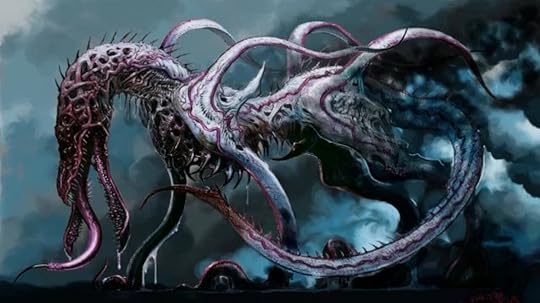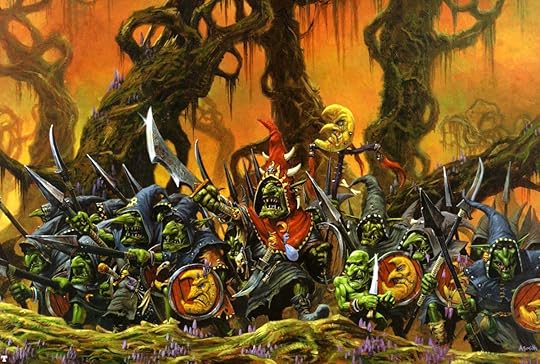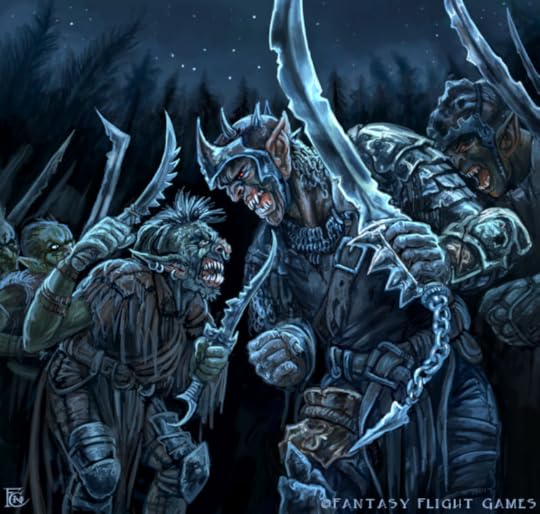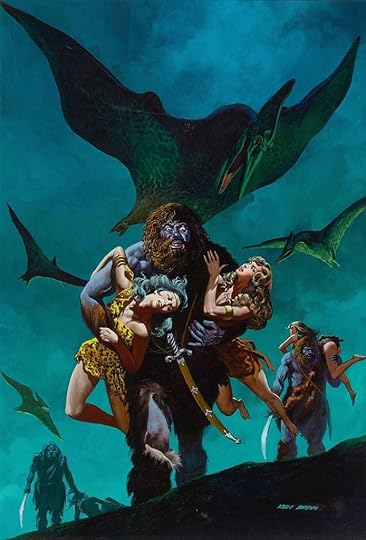Juho Pohjalainen's Blog: Pankarp - Posts Tagged "nazis"
Rules for time travel - the mind of the time traveler as the one true constant
Time travel stories tend to make the entire thing pretty complex: either you'll have to be careful about everything you do lest you accidentally change something really important and alter the lives and memories of everyone you ever knew, essentially making them entirely different people...

...or you're plain unable to change anything at all, the fate of the universe having already been sealed and everything you do failing by default. At best, you already changed the past, everything you do having been taken into account all along. At worst, trying to muck things up results in time paradoxes that can wipe out the universe or send creatures outside of time to fix it and kill you.

So all in all it seems like a pretty raw deal, where all you can do is observe - trying anything more than that will always bite you in the arse - but really I see it as far more simple and also somewhat optimistic, and it's the rule I'm following in the time travel story I write right now, as well as in any time travel story by me.
Here's the essential question: how do you ever know you changed anything, or to what extent? How can you tell what of the present-day situation is thanks to you, and what would've come to be anyway? How much can any of us even begin to comprehend of the tangled mess of time and causality, of events leading to others, and of blame and consequences?
And since we can't possibly know, what harm could we do in the end?
It follows the Already Changed The Past the closest, I suppose, except that you're nearly always allowed to freely choose what to do, since the future you know will not change either way. Unless you start to really, deliberately muck up with things you know didn't go this way, everything will be fine... and even if you do, there's good odds the universe will manage to fix its way somehow anyway.
Let's take an example: one of the very first things people tend to think about, when talking about changing the past for the better, is killing Adolf Hitler. This... almost assuredly wouldn't work, because we all know when and how he died. You can't kill him when he was a child, because that's not how it went and you know it.
But it doesn't mean you couldn't help. Nothing would stop you from infiltrating the Nazi-occupied Europe and helping with the resistance, saving lives, doing the little things you can. After all, it's almost certain that you didn't already know every resistance fighter and every little city skirmish and prison break! Once you return to your time (assuming you survive at all), you could finally read on the subject and see if you could find yourself in the annals of history!
Hmm... this could make for a pretty good historical fiction story, actually. A guy goes back in time to kill Hitler, realizes it doesn't work, but still finds ways to put his future technology and knowledge to a good use. Nazis and WWII really are overused, though, so maybe set it to another time and place, one tragically underused in fiction, and one of which far less material exists so that I wouldn't need to do so much research... see, it works for the convenience of the writer too! The less stuff there already is to be known, the more free I am to do whatever I want!

...or you're plain unable to change anything at all, the fate of the universe having already been sealed and everything you do failing by default. At best, you already changed the past, everything you do having been taken into account all along. At worst, trying to muck things up results in time paradoxes that can wipe out the universe or send creatures outside of time to fix it and kill you.

So all in all it seems like a pretty raw deal, where all you can do is observe - trying anything more than that will always bite you in the arse - but really I see it as far more simple and also somewhat optimistic, and it's the rule I'm following in the time travel story I write right now, as well as in any time travel story by me.
Here's the essential question: how do you ever know you changed anything, or to what extent? How can you tell what of the present-day situation is thanks to you, and what would've come to be anyway? How much can any of us even begin to comprehend of the tangled mess of time and causality, of events leading to others, and of blame and consequences?
And since we can't possibly know, what harm could we do in the end?
It follows the Already Changed The Past the closest, I suppose, except that you're nearly always allowed to freely choose what to do, since the future you know will not change either way. Unless you start to really, deliberately muck up with things you know didn't go this way, everything will be fine... and even if you do, there's good odds the universe will manage to fix its way somehow anyway.
Let's take an example: one of the very first things people tend to think about, when talking about changing the past for the better, is killing Adolf Hitler. This... almost assuredly wouldn't work, because we all know when and how he died. You can't kill him when he was a child, because that's not how it went and you know it.
But it doesn't mean you couldn't help. Nothing would stop you from infiltrating the Nazi-occupied Europe and helping with the resistance, saving lives, doing the little things you can. After all, it's almost certain that you didn't already know every resistance fighter and every little city skirmish and prison break! Once you return to your time (assuming you survive at all), you could finally read on the subject and see if you could find yourself in the annals of history!
Hmm... this could make for a pretty good historical fiction story, actually. A guy goes back in time to kill Hitler, realizes it doesn't work, but still finds ways to put his future technology and knowledge to a good use. Nazis and WWII really are overused, though, so maybe set it to another time and place, one tragically underused in fiction, and one of which far less material exists so that I wouldn't need to do so much research... see, it works for the convenience of the writer too! The less stuff there already is to be known, the more free I am to do whatever I want!
Published on August 25, 2018 13:59
•
Tags:
fantasy, hitler, nazis, paradoxes, research, scifi, time-travel, time-travel-rules, wibbly-wobbly-timey-wimey
More on "evil races"
These past couple days I've been gunning down a lot of Nazis... but unlike when I was a kid, my heart's not really in it anymore.

They're supposed to be the closest the human race has to demons from hell - you should be able to mow them down in dozens and not feel a twinge of regret. But I just can't. What's going on?
Reflecting on it, I'm pretty sure that Humankind: A Hopeful History is to blame. It taught me more about the essential kindness of our species, the love and compassion and hope that lies in the core of even the war and other atrocities we commit. More specifically, it pointed out that even the German soldiers in WW2 fought not for the Nazi ideology, nor against the French and Americans and other enemies, but simply for the love they felt to their fellow soldiers. And I now feel that they do it even in video games - such as Wolfenstein, which I've been playing - and that even though the game gives me no other choice but to kill or be killed, I feel pretty bad doing it now.
Does this mean I can no longer enjoy a lighthearted action romp, videogame shoot-'em-ups or Indiana Jones movies? That you'd have to either establish the enemy as humongous dickbags beyond the uniform they wear (show them gun down civilians, or at least sneer at the main hero), or take the whole thing as a black comedy? Or else be forced to accept the moral greys of things, and not being able to just feel good about an evil being defeated? Perhaps it's not so bad, anyway: all of those options would almost-invariably be deeper and more satisfying than just turning your brain off for a while.
Or you could instead use your brain in finding justification. Make it work.

Great many fantasy enthusiasts in these past couple years have started to reject the notion of evil races entirely. I've written on the subject before myself, both on the nature of evil, and on races such as orcs and their ilk: I like nonhuman races that are inherently alien to us, rather than just humans with some green paint and tusks; and I don't like to throw the word "evil" around lightly. If I am now to create a race that would qualify as most definitely evil, then it'd be more an exception than a rule for me, perhaps just a mental exercise rather than something I'd legitimately write about. But I'm thinking about it now, so here we go.
Looking back at the Humankind book, it's been made apparent that us humans are actually pretty nice folk when you get down to it. We don't like to kill each other; we instinctively jump to the help of one another when we're in trouble; we like to make friends and be social, and more often than not, try to do the right thing. The book calls it "Homo Puppy".
Creating an "evil" race would therefore be a simple matter: just remove this puppiness.
The members of this race don't particularly care to help anyone, even one another. They're not here to make friends and have no problem with killing. No moral compunctions get in the way of their selfish desires and actions. By the standards of humans, they could each of them be diagnosed as sociopaths.

How would they survive, then? By breeding like rabbits and growing fast. This will have the added benefit of them always coming in swarms, giving the heroic badass protagonist plenty to cut down in gory action scenes.
And how did they come to be in the first place? They don't seem the type to thrive by cooperation: rather, evolution (or some warrior-god) would have come up with them as an extreme illustration of the ideal of Survival of the Fittest: plenty of them are spat out into the world, but only the strongest, the toughest, or the most cunning of them ever survive to continue their bloodline. Strongly individualistic, looking to do things on their own and shun aid whenever possible: clever, self-sufficient, and very fast learners - those that weren't, would never make it to adulthood.
If any of them manage to make it out alive of your heroic massacre, you best beware: they'll learn from their mistakes and come back so much stronger and cleverer. Always confirm kills.

Yet for all of this... if you are the type that would like some moral greys and diplomacy in your stories, none of this still precludes making friends with a few. If met in peacetime, they might enjoy your company on an intellectual level, not rush into killing you - look for alternatives - even help you out in a pinch if there's something to it for them. Golden Rule is rooted less in compassion, far more in greater long-term payoff - they could most definitely understand it, and help people in return for assistance to themselves. Just that they'd be rather more mercenary about it.
But even so, the world would most assuredly be better off without them. So don't feel bad if you need to kill a bunch in a war. They're like double-nazis that way.
...Say. A lot of modern research suggests that neanderthals were quite smart and inventive individually, but had very little instinct in sharing their discoveries or helping each other out in general. The Humankind book above compared them to powerful modern computers, while humans were older and slower machines but with a working WiFi. That's got a lot in common with what I just went on about.
Were neanderthals the real-world orcs? Were they all killed off because they were a bunch of evil conquering psychos, possibly in the service of a dark lord?

If so, that just goes to show that if you live in a fantasy world, you better get on killing evil now and kill them fast, before they run out altogether. Get going while the going's good.
(I have absolutely no relevant education or decrees. My only trait is overthinking.)

They're supposed to be the closest the human race has to demons from hell - you should be able to mow them down in dozens and not feel a twinge of regret. But I just can't. What's going on?
Reflecting on it, I'm pretty sure that Humankind: A Hopeful History is to blame. It taught me more about the essential kindness of our species, the love and compassion and hope that lies in the core of even the war and other atrocities we commit. More specifically, it pointed out that even the German soldiers in WW2 fought not for the Nazi ideology, nor against the French and Americans and other enemies, but simply for the love they felt to their fellow soldiers. And I now feel that they do it even in video games - such as Wolfenstein, which I've been playing - and that even though the game gives me no other choice but to kill or be killed, I feel pretty bad doing it now.
Does this mean I can no longer enjoy a lighthearted action romp, videogame shoot-'em-ups or Indiana Jones movies? That you'd have to either establish the enemy as humongous dickbags beyond the uniform they wear (show them gun down civilians, or at least sneer at the main hero), or take the whole thing as a black comedy? Or else be forced to accept the moral greys of things, and not being able to just feel good about an evil being defeated? Perhaps it's not so bad, anyway: all of those options would almost-invariably be deeper and more satisfying than just turning your brain off for a while.
Or you could instead use your brain in finding justification. Make it work.

Great many fantasy enthusiasts in these past couple years have started to reject the notion of evil races entirely. I've written on the subject before myself, both on the nature of evil, and on races such as orcs and their ilk: I like nonhuman races that are inherently alien to us, rather than just humans with some green paint and tusks; and I don't like to throw the word "evil" around lightly. If I am now to create a race that would qualify as most definitely evil, then it'd be more an exception than a rule for me, perhaps just a mental exercise rather than something I'd legitimately write about. But I'm thinking about it now, so here we go.
Looking back at the Humankind book, it's been made apparent that us humans are actually pretty nice folk when you get down to it. We don't like to kill each other; we instinctively jump to the help of one another when we're in trouble; we like to make friends and be social, and more often than not, try to do the right thing. The book calls it "Homo Puppy".
Creating an "evil" race would therefore be a simple matter: just remove this puppiness.
The members of this race don't particularly care to help anyone, even one another. They're not here to make friends and have no problem with killing. No moral compunctions get in the way of their selfish desires and actions. By the standards of humans, they could each of them be diagnosed as sociopaths.

How would they survive, then? By breeding like rabbits and growing fast. This will have the added benefit of them always coming in swarms, giving the heroic badass protagonist plenty to cut down in gory action scenes.
And how did they come to be in the first place? They don't seem the type to thrive by cooperation: rather, evolution (or some warrior-god) would have come up with them as an extreme illustration of the ideal of Survival of the Fittest: plenty of them are spat out into the world, but only the strongest, the toughest, or the most cunning of them ever survive to continue their bloodline. Strongly individualistic, looking to do things on their own and shun aid whenever possible: clever, self-sufficient, and very fast learners - those that weren't, would never make it to adulthood.
If any of them manage to make it out alive of your heroic massacre, you best beware: they'll learn from their mistakes and come back so much stronger and cleverer. Always confirm kills.

Yet for all of this... if you are the type that would like some moral greys and diplomacy in your stories, none of this still precludes making friends with a few. If met in peacetime, they might enjoy your company on an intellectual level, not rush into killing you - look for alternatives - even help you out in a pinch if there's something to it for them. Golden Rule is rooted less in compassion, far more in greater long-term payoff - they could most definitely understand it, and help people in return for assistance to themselves. Just that they'd be rather more mercenary about it.
But even so, the world would most assuredly be better off without them. So don't feel bad if you need to kill a bunch in a war. They're like double-nazis that way.
...Say. A lot of modern research suggests that neanderthals were quite smart and inventive individually, but had very little instinct in sharing their discoveries or helping each other out in general. The Humankind book above compared them to powerful modern computers, while humans were older and slower machines but with a working WiFi. That's got a lot in common with what I just went on about.
Were neanderthals the real-world orcs? Were they all killed off because they were a bunch of evil conquering psychos, possibly in the service of a dark lord?

If so, that just goes to show that if you live in a fantasy world, you better get on killing evil now and kill them fast, before they run out altogether. Get going while the going's good.
(I have absolutely no relevant education or decrees. My only trait is overthinking.)
Published on May 14, 2021 07:36
•
Tags:
evil, evil-races, fantasy, nazis, neanderthals, psychology, races, sociopathy
Pankarp
Pages fallen out of Straggler's journal, and others.
Pages fallen out of Straggler's journal, and others.
...more
- Juho Pohjalainen's profile
- 351 followers



